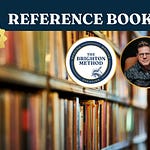In Video, Transcript and Summary Formats
We have a video available for those who prefer watching, a casual transcript for those who prefer reading, and a list of key points for a quick overview. You can choose the format that works best for you!
Key Points:
Stephen Covey - thank you!
Pay attention to THE MUSE if you can see an ending.
Work backwards with the end in mind.
Recreate instead of create.
Quick Transcript:
Hello everybody and welcome back to another edition of Reading and Writing with Robert Brighton. Today we're going to talk about BEGINNING WITH THE END IN MIND. Now what does that mean? Well, first of all, I have to tell you, I got that phrase from the late great Stephen Covey, who, probably 30 years ago or more, wrote a book called The Seven Habits of Highly Effective People. The fact that it's 30 years old does not mean that it's not, it's still a great book because it is. And I was very fortunate to meet Stephen Covey once he came to speak at a corporate event I was attending. I remember that one of those seven habits that he talked about was something he called Begin With the End in Mind.
So thank you Mr. Covey, for that phrase because it's a beautiful phrase and as a writer it brings especially true because, if you know how a stretch of dialogue or a scene or even your book ends, it is going to be much easier for you to write that dialogue, that scene, or that book, than if you are going along and figure out figuring out as you go.
Now don't get me wrong, this does not always happen. You're not always presented with the solution to the mystery, but when you are, pay attention to it. This is a sign from the muse that you're doing something right. Do not pass it by if you know how a scene ends. The best thing to do is start with the way it ends and back up into all the detail that led to that ending.
An example might be . . . two people getting married. Well, if I wanted to write a story about two people who got married, I would want to talk a little bit about how they grew up and how they think about things and how they met and how their romance developed. And finally they became committed and decided to get married.
You could write like that. And I do, making things up in effect as I go along. But now think about how much easier it is if you know that these two people got married and now I can just go backwards in time and recreate their lives. I don't have to create their lives from birth to marriage, I can recreate their lives.
Well, I know they're two adults and they got married and now I go one half step. What, what were they doing when they were single? Or how did they meet? You know, I invent these things in reverse and it's very easy to do and much more natural a process in many ways, because think about it, it's a little like real life.
In our real life. I can't possibly predict what's going to happen to me in the next five minutes, or even, let's say a year from now, all the things that I'm going to do, the twists and turns, the roads I take, the roads I don't take, there's no way to predict where that ends up. And the same is true when you're writing.
It's kind of hard to know where things are going because we never know where things are going. So if you know the end, if I knew for example, that I would be getting a new job in a year from now, you know I could never tell you what might lead from this moment to that new job, but if on the day I get that new job, you ask me, how did you get this new job, I can just go back in time and tell the story really easily. So even though a novel or a story or even a report is generally arranged chronologically from oldest information to newest, I say, if you know how it ends, turn it on its head and start with the end in mind. Begin with the end in mind as Stephen Covey said long ago.
So, what we're going to do is . . . like everything in Reading and Writing with Robert Brighton, is kind of my academic treatment of it. If you're following along on The Mosquito God tab, you're going to get the maximum benefit out of these building blocks from this course though, because you will see as these things come up how I deal with them.
For example, you know, I may not know the way the whole book ends. But I do know how certain scenes end, and I do know how certain portions of dialogue end. So you'll actually see how I put this into practice. So that's why these two courses are kind of yin and yang. This is the course that's going to teach you all the basics that are applicable in any situation.
By following along with the writing of an actual novel, that is going to show you how I put them in practice, and eat my own cooking as I write, so, stick around. I'll have lots of examples about how to Begin With the End in Mind. Thank you.
















Share this post